This guide will walk you through the importance of your thyroid gland, the 6 steps involved in thyroid hormone function, common disorders of thyroid gland disease, and the symptoms that follow.
Thyroid Gland Basics and Thyroid Physiology 101
Your thyroid gland is an endocrine gland that sits at the base of your neck.
The word endocrine gland literally means a gland that produces hormones that get dumped directly into the blood.
Thyroid hormone then circulates around your body and influences cells.
Your thyroid gland is incredibly important because it secretes one of the most important hormones in your body: thyroid hormone.
Thyroid hormone is a master hormone because it acts to influence other hormones and mediates several critical functions in your body.
Your thyroid helps regulate the following:
- Your body weight (1)
- Your metabolism (2) (meaning how many calories you burn at rest)
- Heat production in your body (3)
- Cosmetic features such as nail growth, hair growth, and skin texture (4)
- Intestinal Motility (5)
- Sex hormones such as estrogen, progesterone (6), and testosterone
- Cortisol and other hormones that influence your subjective sense of energy (7)
- Promotes normal cognition and mood (8)
- Helps regulate blood pressure (9), cholesterol (10), and heart rate (11)
- And much more…
Because thyroid hormone is secreted from your thyroid gland it’s very important that you understand the basics of how it works.
Why?
Because slight imbalances in thyroid hormone production and release can result in serious symptoms.
And it is often the case that an early warning sign of thyroid gland dysfunction is low circulating levels of thyroid hormone in the body.
And these symptoms range from a loss in energy to weight gain and even changes in your mood (we will go over these below).
For this reason, it’s important that you understand how your thyroid gland functions so that you can identify if problems exist.
Bottom Line: Thyroid hormone is secreted from your thyroid gland. Thyroid hormone is a master hormone because it influences other hormones and regulates many important functions in the body.
How the Thyroid Gland Works
Thyroid hormone release and regulation is actually a fairly complex system.
It doesn’t have to be incredibly difficult to understand though, which is why I’ve listed all of the steps involved in an easy-to-follow series.
As you follow these steps just realize that they are indeed simplified.
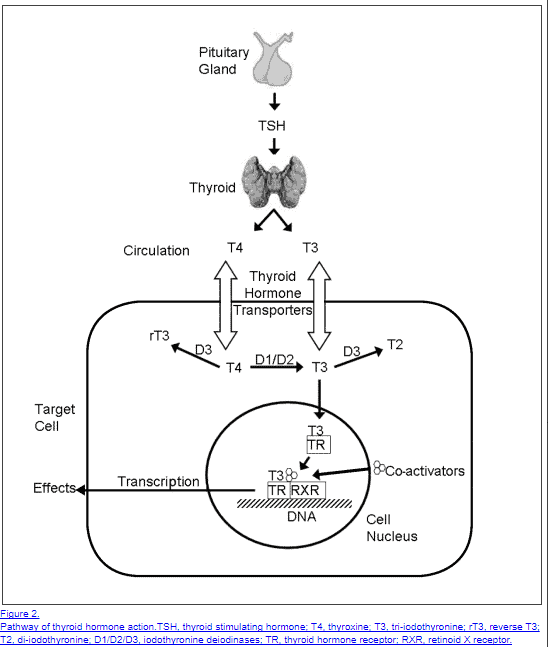
In addition, you should understand that even though we have come a long way in understanding how thyroid function works in the body we are still not 100% sure of everything.
Before we discuss how your thyroid gland works it’s important that you have a basic understanding of thyroid hormones (these will come in handy later).
For our purposes you need to understand the following thyroid hormones:
- T4 (Thyroxine) – T4 is secreted in large amounts from your thyroid gland and T4 has relatively little biological activity unless it is transformed into either T3 or reverse T3.
- T3 (Triiodothyronine) – T3 is the thyroid hormone that has the most activity compared to other thyroid hormones and is considered the most biologically active thyroid hormone. Compared to T4 you have much less T3 in your body and bloodstream.
- Reverse T3 – Reverse T3 is created from the thyroid hormone T4 and is used to help regulate thyroid hormone demand. Reverse T3 acts to directly block the cellular effects of T3.
Now that you have a basic understanding let’s fill in the rest:
Step #1: TRH Secretion
Remember:
No less than 6 steps and 3 organ systems are required for proper thyroid gland function in the body.
And this first step starts in a region of your brain known as the hypothalamus.
Together with your pituitary and your thyroid gland the hypothalamus forms what is known as the Hypothalamic-Pituitary-Thyroid Axis (13) (or HPT axis for short).
This HPT axis is a series of 3 organs that all communicate with one another and help your body determine how much thyroid hormone needs to be released from your thyroid gland.
Your hypothalamus is constantly sensing changes in your bloodstream that may indicate you need changes to your thyroid hormone.
It senses changes in your stress levels, the values of other hormones circulating in your bloodstream, nutritional status, and so on.
Through these inputs, your hypothalamus helps set the baseline production of a prohormone known as TRH (Thyrotropin Releasing Hormone) which is the first step in thyroid hormone production.
TRH is very important because of its influence on the entire cascade and it can be used to help determine if there is damage to your metabolism.
TRH then acts on the second step in this 6-step series the pituitary gland.
Step #2: TSH Secretion
TRH travels through the brain and influences the production of another prohormone known as Thyroid stimulating hormone or TSH which is located in the anterior pituitary.
TSH can be tested in the serum (your blood) as is often used as a marker of thyroid function in the body.
The value of TSH is that it can help give you an idea as to what is happening in the brain and how that is impacting the production of thyroid hormone release from the thyroid gland.
TSH does exactly as its names suggests:
It causes the stimulation and therefore the release of thyroid hormone from the thyroid gland.
The TSH is often the only test that Doctors use to diagnose and treat your thyroid.
This approach may work for many people but there is a large subgroup of patients who need further testing in order to adequately determine thyroid function.
In addition, TSH may fall short in diagnosing certain disease states for reasons that I’ve discussed here.
Step #3: Thyroid Hormone Release from the Thyroid Gland
TSH is secreted into the bloodstream where it travels down to your neck and directly influences your thyroid gland.
Under the influence of TSH, your thyroid gland secretes a combination of T4 and T3 thyroid hormones.
The exact quantity of thyroid hormone that is released is not known exactly, but it is estimated that up to 20% of thyroid hormone produced is in the T3 form and the other 80% is in the T4 form (14).
Other studies estimated that this ratio is even more skewed towards T4 (meaning more T4 is released than 80%) but the studies are conflicted.
In addition, it likely depends on the specific person and their specific situation.
The amount of thyroid hormone you release will be displayed in the serum lab tests T3 and T4 which can be tested as either Free T4/T3 or Total T3.
This number helps give you an idea of how active the thyroid gland is and how responsive it is to TSH.
Certain conditions, especially those in which the thyroid gland has been damaged, may not respond to the release of TSH simply because they can’t!
It’s like yelling at someone who is deaf, it doesn’t matter how loud you yell they won’t be able to hear you.
And in a similar fashion, your thyroid may not respond to TSH.
In these scenarios, it’s important to evaluate serum thyroid hormone markers which can help give you an idea of how functional the thyroid gland is (assuming you aren’t taking thyroid medication).
Step #4: Thyroid Hormone Conversion (T4 -> T3)
After thyroid hormone is released from the thyroid gland it is finally free to flow around in the bloodstream.
From the bloodstream, it can then enter into the cells of distant tissues and cause the characteristic effects of thyroid hormone.
Thyroid hormone that is released from your thyroid gland travels to tissues ALL over your body.
It makes it to your heart tissue, your brain tissue, your muscles, and so on.
But in order for thyroid hormone to actually influence your cells, it first must be activated.
This activation process is commonly referred to as thyroid hormone conversion.
Thyroid hormone conversion is the process by which T4 (Thyroxine) is turned into the active thyroid hormone T3 (Triiodothyronine) through certain enzymes known as deiodinases.
The conversion of T4 into T3 is a CRITICAL and VERY important step in thyroid physiology and function.
And here’s why:
Imagine a scenario in which your Hypothalamus is working fine, your pituitary is working fine and even your thyroid gland is producing sufficient thyroid hormone.
All of these steps are in working order but your body isn’t able to turn T4 into the active thyroid hormone T3 in peripheral tissues.
Everything looks good in this scenario until you realize that in order for thyroid hormone to function it MUST be activated.
And if it is NOT activated then patients may experience serious symptoms (15).
For this reason, it’s important to understand the role of reverse T3.
Reverse T3 is the step-sister to T3, but reverse T3 acts to directly block the beneficial effects of T3 at the cellular level.
This is a good thing if you have too much thyroid floating around in your blood and it’s a good way for your body to tightly control how much thyroid hormone is being activated.

The problem with this system is that it can become dysregulated and become a problem.
It is possible to have high levels of reverse T3 in the serum which can cause thyroid gland issues.
This condition is commonly referred to as euthyroid sick syndrome or low T3 syndrome.
The conversion of T4 to T3 is regulated by your individual cells through the use of certain enzymes.
Other tissues in your body such as your liver and your GI tract are also responsible for a large portion of the conversion that occurs.
Therefore if you have intestinal issues or liver damage this process might also be damaged or not function properly.
This is one important way that other organ systems tie into thyroid function in the body.
Step #5: Thyroid hormone Action
It took 4 other individual steps to get to this point and we aren’t even done yet.
Once thyroid hormone has been released from your thyroid gland and then activated in your tissues it is finally able to act on your cells!
Thyroid hormone acts on your cells through two very important mechanisms:
- Genomic Effects – Genomic effects occur when certain hormones or signals directly impact genetic transcription (16). This process results in the creation of enzymes and other proteins from the nucleus of the cell. Many of the important effects of thyroid hormone are mediated through nuclear receptors in your cells. One example of genomic effects mediated through thyroid hormone is the effect of increased energy that you feel when taking thyroid hormone (if you are deficient). Thyroid hormone increases the production of enzymes that increase ATP production in your mitochondria which help you increase energy levels and reduce fatigue.
- Non-Genomic Effects (17) – Non-genomic effects are effects that are mediated outside of the nucleus and occur usually directly on the surface of the cell. One example of a non-genomic action of thyroid hormone is the influence that T3 has on the calcium channels in your heart. T3 directly increases the activity of these channels which results in an increase in heart rate which is often felt as palpitations in certain patients who take too much thyroid hormone.
Currently, we don’t have a great way to test for the effects of thyroid hormone on your cellular tissues except to monitor your symptoms.
So for instance:
Let’s say you are experiencing fatigue, hair loss, and weight gain as a result of thyroid gland dysfunction (in this case it would be hypothyroidism).
If you take thyroid hormone replacement you SHOULD notice an increase in energy, a reduction in hair loss, and a reduction in your weight.
All of these benefits would be mediated through the genomic and non-genomic effects that thyroid hormone has on your cells.
Hopefully, this makes sense!
This concept is why you can use your symptoms as a potential guide (not the only guide) to determine if your thyroid is working properly!
Step #6: Feedback loop & Regulation
The last and final step in this series is the feedback loop that occurs at the end.
Basically what happens is if everything is working correctly then thyroid hormone that is floating around in circulation will “talk” to your hypothalamus to help make sure all of your tissues are on the same page.
How else would your brain have any idea what is happening to your liver?
It occurs through this feedback loop.
We also use this feedback loop to our advantage to help us determine, in part, if someone is taking enough thyroid hormone medication.
If you give someone thyroid medication, let’s use Levothyroxine for this example, then that levothyroxine will be absorbed into your body and signal to your brain that there is some thyroid hormone floating around in the blood.
Your brain will react by reducing the amount of TRH it produces and therefore TSH as well.
So as you take thyroid hormone medication your TSH level will slowly drop (provided you are taking enough and provided it is being absorbed).
Symptoms of Thyroid Gland Disorders
So what happens if this system becomes dysregulated or has any problems at all?
It turns out that pretty much ANY of the steps above can have become damaged or not work properly.
The result is almost always felt as clinical symptoms by the patient.
But does that mean that ALL thyroid gland problems result in symptoms?
No.
In fact, many thyroid gland issues such as thyroid nodules and sometimes even thyroid cancer may not present with any symptoms at all!
With that in mind let’s break down common symptoms that you MAY experience if you have issues…
If you are going to experience symptoms it really depends on a lot of factors including which steps are not functioning properly and if anything is happening directly to your thyroid gland.
In many cases thyroid gland problems fall into two major camps:
- Symptoms of a sluggish thyroid gland (meaning you aren’t creating ENOUGH thyroid hormone or the gland isn’t functioning properly)
- Symptoms of excessive thyroid hormone production (meaning your body is producing TOO much thyroid hormone or your thyroid gland is pumping out too much thyroid hormone)
Hypothyroidism Symptoms (Insufficient Gland Function)
When your thyroid gland isn’t producing enough thyroid hormone or functioning properly then you may experience any of the following symptoms:
- Fatigue or low energy
- Weight gain (anywhere between 10 pounds and 50 pounds)
- Menstrual irregularities
- Depression
- Cold intolerance
- Hair breakage
- Nail damage
- Cold body temperature
- Low resting heart rate
- Constipation
- Cold extremities (cold hands and feet)
- Chronic pain
This list is not comprehensive but it should give you a pretty good idea of how to get started.
If you are experiencing any of these symptoms then you should get a complete thyroid blood panel to determine if these symptoms are related to your thyroid.
In some cases, which can make things tricky, certain symptoms may be related to OTHER hormone systems but mimic “thyroid symptoms”.
Getting the right blood tests can help tease this out.
Hyperthyroid Symptoms (Excessive Gland Function)
When your thyroid gland is producing TOO MUCH thyroid hormone then you may experience any of the following symptoms:
- Weight loss
- Rapid heart rate
- Heart palpitations
- Anxiety
- Insomnia
- Diarrhea
- Tremors
- Hot flashes
- Excessive sweating
- Dry skin
- Hair breakage (happens in both conditions!)
Hyperthyroid symptoms tend to be difficult to miss and most often patients will present to the Doctor and figure out the problem quickly.
Hypothyroid symptoms tend to be more non-specific and some patients may be wrongly diagnosed with conditions such as “getting older” or “depression” instead of hypothyroidism.
Bottom Line: Thyroid gland disorders can cause symptoms of excessive thyroid hormone production (hyperthyroidism), symptoms of low thyroid hormone production (hypothyroidism) or they can be asymptomatic (meaning they don’t have any symptoms).
Common Thyroid Gland Disorders
So what kind of problems cause thyroid gland symptoms?
Like other organs in your body, there are MANY different problems that can occur with your thyroid gland.
Below you will find a brief description of the most common thyroid gland disorders:
Hypothyroidism
Hypothyroidism is usually the result of direct damage to the thyroid gland but it can also be caused by other conditions.
Any condition that causes a reduction in TRH, TSH, or thyroid hormone conversion may also cause the symptoms associated with hypothyroidism.
Other patients who may experience hypothyroid symptoms include those who have had their thyroid completely removed (usually for thyroid cancer), those who have end-stage Hashimoto’s thyroiditis, and those who have undergone Radioactive Iodine Ablation.
The treatment for hypothyroidism is usually with different types of thyroid hormone replacement therapy.
These medications contain active and inactive thyroid hormones like T4 and T3.
By ingesting thyroid medication you are effectively doing the job of the thyroid but through the use of medication.
It should be pointed out though that we are never as good as your thyroid gland at dosing thyroid hormone!
It is estimated that up to 10% of the population suffers from Hypothyroidism (18) making it incredibly common.
Thyroiditis
Thyroiditis is a non-specific condition that is the result of inflammation in the thyroid gland itself.
This inflammation can be caused by autoimmune disease (like in conditions such as Hashimoto’s thyroiditis and Graves’ disease), trauma (like in accidents), and infections (like from a virus/bacteria).
The severity of thyroiditis can range from something that will be benign and go away on its own over time to conditions such as Hashimoto’s thyroiditis which may completely destroy your thyroid gland if left untreated.
The treatment for Thyroiditis ranges from complete removal of the thyroid gland to the use of thyroid medications – it really just depends on the cause.
Because thyroiditis is all over the board you can read more about the specifics of it here.
For this discussion, the most serious conditions include Graves’ disease and Hashimoto’s disease because they most often result in damage to the thyroid gland and they often require treatment.
Hyperthyroidism
Hyperthyroidism is the complete opposite of hypothyroidism.
In this condition, patients secrete too much thyroid hormone and display very significant and characteristic symptoms.
Because hyperthyroidism is a very dangerous condition the treatment is usually to block the effects of thyroid hormone at the cellular level, remove the thyroid gland or destroy the thyroid gland with radiated iodine.
Most hyperthyroid patients, especially after the treatments described above, will end up in a condition of hypothyroidism.
So as an example:
If you have hyperthyroidism from Graves’ disease and you undergo radioactive iodine ablation therapy (19) as treatment then you will most likely need thyroid hormone replacement therapy.
This can be confusing to some patients.
Why would we give you thyroid hormone if your problem is TOO much thyroid hormone?
The real reason is that the treatment for hyperthyroid patients is often to destroy or remove the thyroid gland which leaves them in the exact opposite situation.
Thyroid Cancer
Thyroid cancer is not as common as the other conditions listed here but it is still important.
Luckily the vast majority of thyroid cases are caught early and do not result in significant mortality (death) to patients.
The 5-year survival for thyroid cancer is in the high 90th percentile range (20).
Thyroid cancer tends to develop from thyroid nodules which are VERY common.
If thyroid cancer is present the treatment is to completely remove the thyroid gland with a procedure known as a complete thyroidectomy.
Thyroid Nodules
Thyroid nodules simply represent an overgrowth of thyroid tissue directly in your thyroid gland.
Most of these nodules are NOT cancerous and simply need to be monitored to make sure they aren’t growing.
It is estimated that hundreds of millions of people have thyroid nodules (21) and they are walking around with these nodules WITHOUT any symptoms.
Most often thyroid nodules are found through a routine physical exam at a doctor’s office.
From there they are usually monitored with periodic ultrasound imaging but occasionally you may need to get a biopsy to confirm that they are not dangerous.
Bottom Line: Thyroid gland disorders are wide and diverse. The treatment for thyroid gland disorders is usually to try and “even” out thyroid hormone in the body. If you don’t have enough then Doctors will give you more, if you have too much then your Doctor will try to reduce it by removing or damaging your thyroid.
Wrapping it up
The bottom line?
Your thyroid gland may be one of the most important glands in your body because it holds and secretes the master hormone.
Thyroid function is tightly regulated by several organ systems and feedback loops in multiple areas of your body.
From start to finish there are no less than 6 very important steps.
Small changes to thyroid hormone in the body may spell out big symptoms that you will feel day to day.
If you think you may be experiencing thyroid gland dysfunction make sure you get a complete lab test to determine if your thyroid is compromised.
You can learn more about thyroid lab testing here including which tests you should be getting to evaluate all 6 steps.
Now I want to hear from you:
Are you suffering from thyroid gland problems?
Have you been diagnosed with a thyroid condition?
Which symptoms are you experiencing?
Leave your comments below!
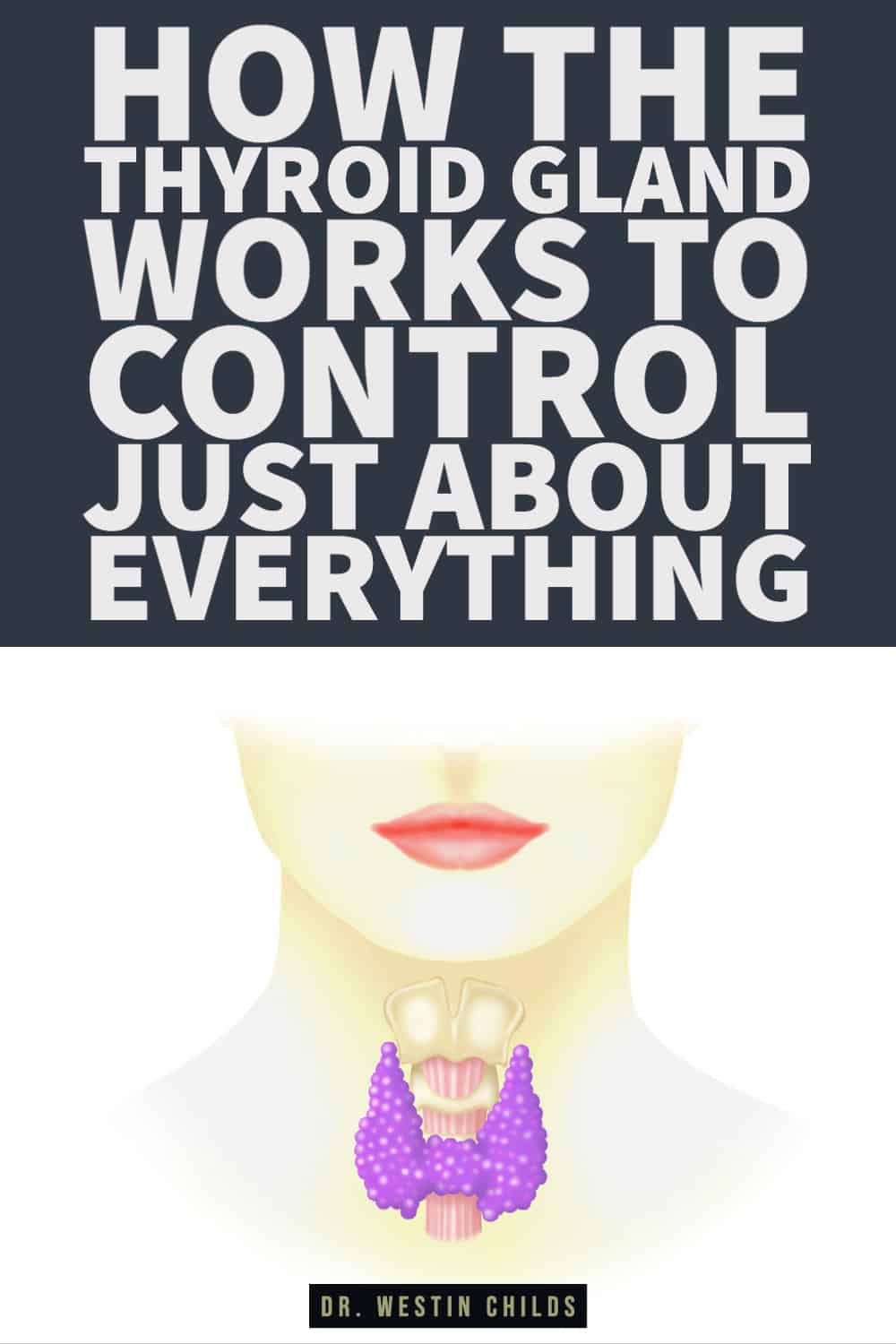
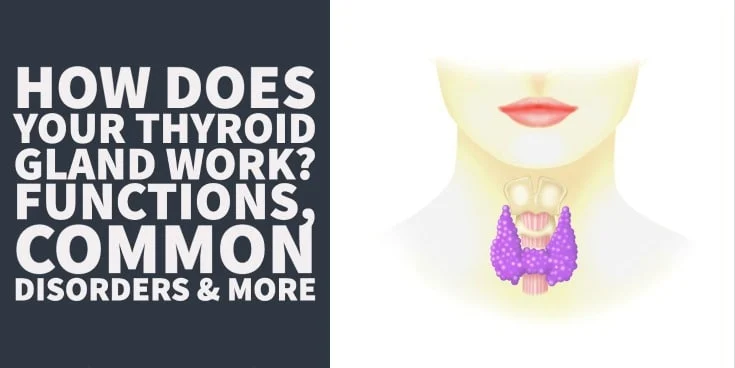
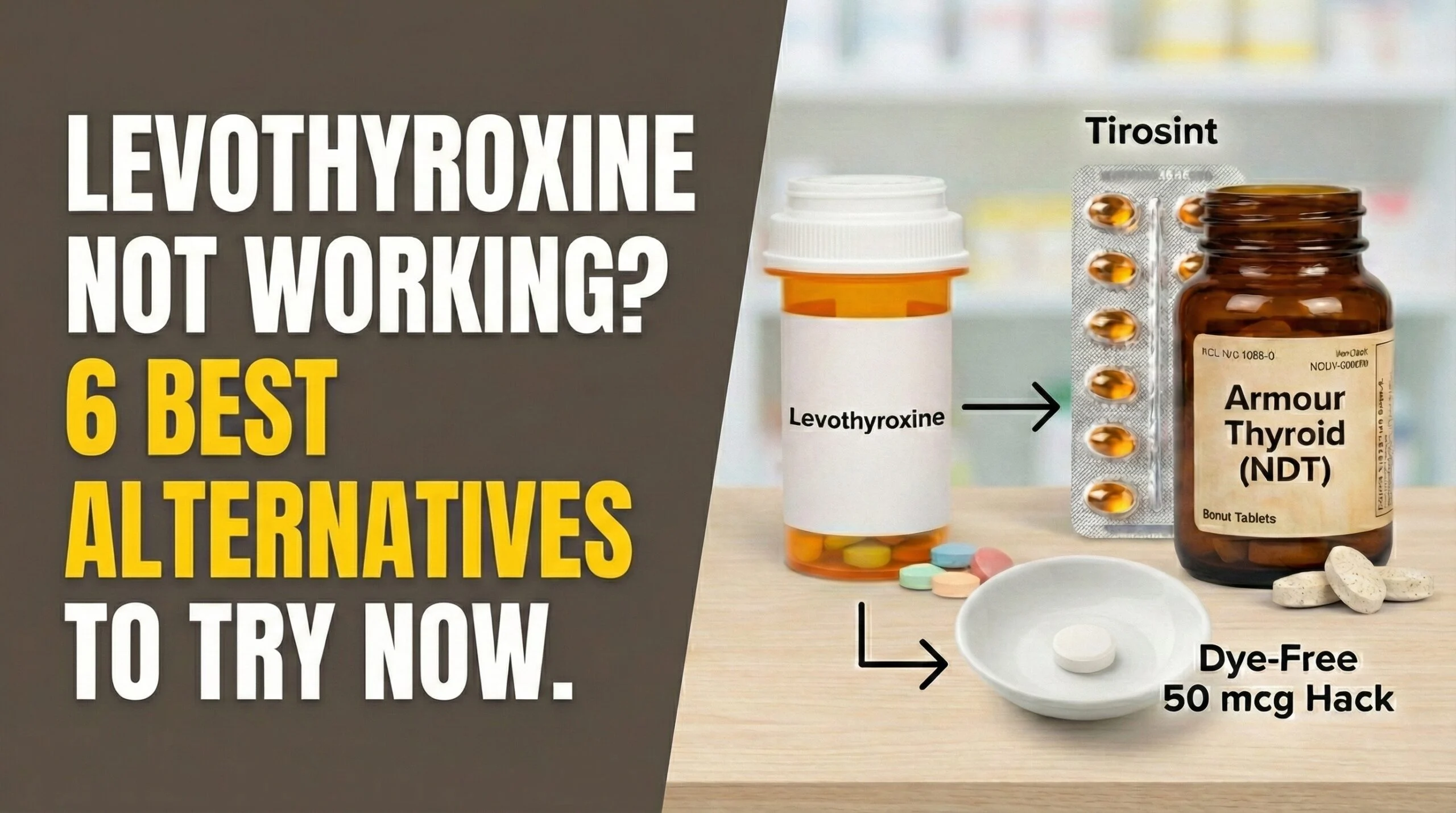
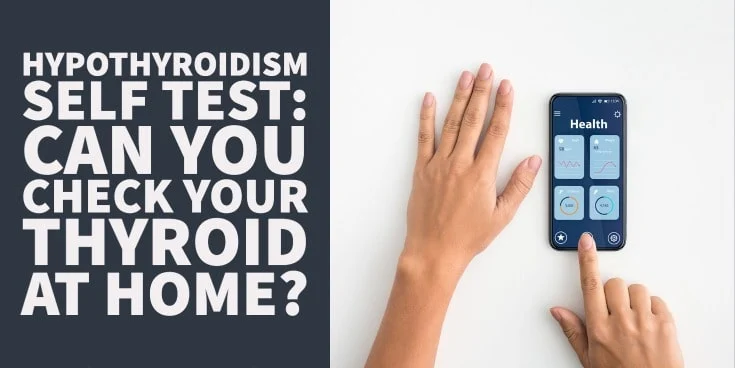
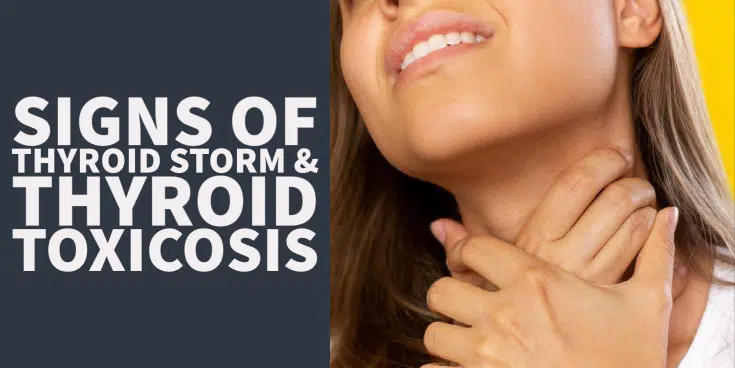
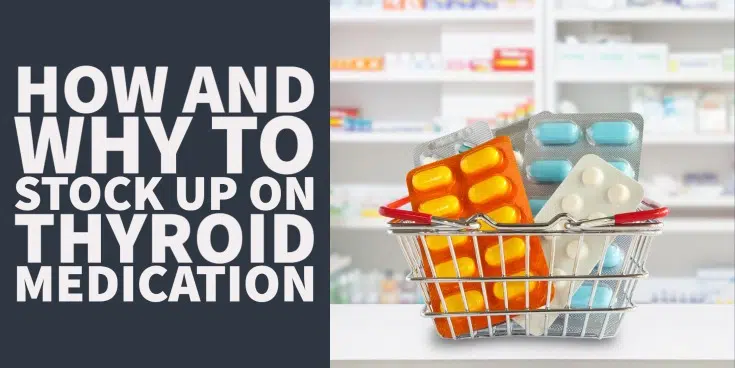
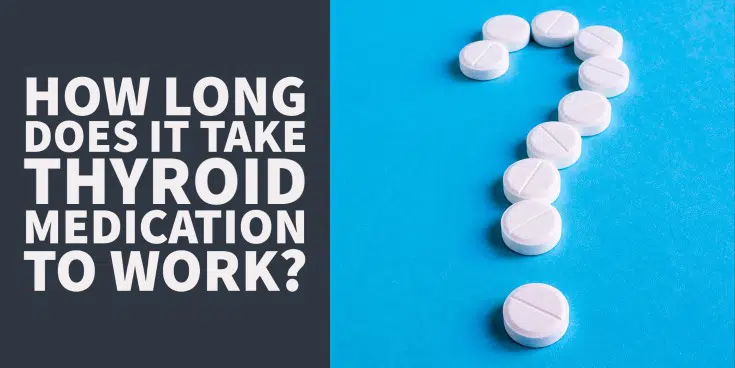
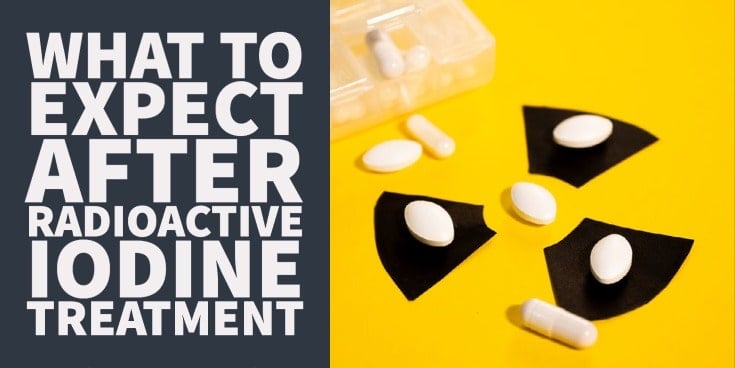

You have educated me so much on my thyroid problem and I now understand. I wish more doctors/endocrinologists were like you. You are saving me thousands of dollars in tests by stressing the importance of intestinal/gut health. I look forward to your daily emails…thank you!
Hi Genia,
Glad you find them helpful! And please keep us updated on your progress 🙂
Dr. Childs, Thank you again for your informative articles. I gained tremendous insight from your highly detailed article about tissue level hypothyroidism and have a question in regard to that. TLH is known to cause painful, tight muscles due to lack of available energy. In relation to that, one needs to ‘relax’ in order to allow the detrusor muscle to empty the bladder. My prostate is normal, but much of the time it seems like I’m fighting against myself to ‘go’. Does this make sense, if – like in the analogy to rigor mortis – the retention muscles lack energy and just won’t relent? I would like to be informed (or corrected) so I can engage in an educated discussion on the subject with my urologist, endocrinologist, and/or other doctors. Any feedback would be very much appreciated.
Hi Joel,
The innervation of the bladder is under autonomic control (sympathetic and parasympathetic control) compared to the voluntary control that your large muscles are under. I’m not 100% sure but I believe those muscles are considered smooth muscles and may not be comparable to your anaology in rigor mortis and may. In my experience most of the time bladder control issues are usually caused by poor pelvic floor musculature, prostate issues and/or autonomic dysfunction – not usually thyroid disease.
You can read more here for more info: https://www.ncbi.nlm.nih.gov/pmc/articles/PMC1472861/
You are correct, about those being smooth muscles, Dr. Childs. Sometimes things move well, sometimes it’s like trying to go and still holding simultaneously to one degree or another. If I let my bladder get really full it feels tight like a rock and the real battle begins. Prostate issues have been ruled out, but if pelvic floor muscles are lacking ATP that may be a factor related to tissue level hypothyroidism (of which I have most if not all symptoms). Have yet to explore/consider autonomic dysfunction, but it seems unlikely. I was finally treated for SIBO in September and felt great for the first time in years, then chronic pain of hypothyroidism definitely became a huge problem – especially when the colder seasons hit. Thanks for your reply and link. You know I will look well into the matter. As from our original conversation several weeks ago, you *still* rock, doctor.
Thank you Dr. Childs, this has given me a full explanation of how the thyroid works. I’ve just been told by my dr that I need to increase my dose of levothyroxine which has remained the same for about 9 years. I’m peri menopausal and was wondering if this is having an effect on my T4 levels.
Hi Carol,
There is certainly a relationship between progesterone and thyroid function which may alter thyroid hormone levels, but the magnitude of this relationship is not well understood and may vary from person to person.
I have had my entire thyroid removed because of cancer cells present. I was recently in the hospital and had multiple tests they said my thyroid levels are normal, but I DON’T have a thyroid gland. How is that possible. I was taken off meds 8 months ago. I took synthoird for 10 years, then a new Dr. Said levothyroxine would be fine. I started having skin issues and severe weight gain with the levothyroxine. ..
Hi Theresa,
Was your entire thyroid removed? Even in a complete thyroidectomy some thyroid tissue remains and if there is some function then your serum lab tests may looked relatively preserved. In addition it may also be that they did not order free thyroid hormone levels which would tell the entire story.
I had cancer in neck and had radiation in 2005,been cold ever since had tests done then they tell me I have no problem. Went to the endocrinologist and she looked with ultra sound and said the thyroid is perfect and she put me on Megace. when I filled prescription the pharmacist said there was no need for Megace and said she is useing it off the usual way. It is not helping in any way. I am in HMO and want to get an outside blood test but a full thyroid test not just the one they want to give me.When I tried to get a second iopinion the doctor went by the previous doctors conclusion without other testing.
Hi there,
I would definitely look into finding a physician who is knowledgable on the subject, you can read more about how to do that here: https://www.restartmed.com/thyroid-doctor/
I have been diagnosed with Hashimoto’s. Have been able to put into remission with diet changes and supplements, but still have cold intolerance, poor strength, brittle nails, poor sleep. Have just switch from NP Thyroid to Nature thyroid.
Doesn’t make any sense. I got low TSH level but normal free t4 and high free t3 level but only slightly high freet3 levels.
A recent chest CT showed the left lobe of the thyroid gland is missing or atrophied. I am not aware of any symptoms. Should I be concerned??
Hi Betty,
It may not be a huge deal as long as your other gland is functioning at 100%. You should spend some time trying to figure out what caused atrophy of the left thyroid gland, though, to make sure it doesn’t happen to the other side!
What a waste of air time ! You used all the words w/ “thyroid” in them, but you never gave ONE resulting common condition? “COMMON” — you know, that’s for us non-medical persons. How about swelling of the lower legs? sepsis? mental abnormalities such as _________ and __________?
Hi Don,
I think perhaps you are confused. The two most common thyroid conditions (as mentioned in the article) are hypothyroidism and hyperthyroidism.
On Oct 2023 I started taking Dr Childs Bundle: T3 Conversion Booster, Essential T2, Thyroid Adrenal Reset Complex and Thyro Biotic! I do seem to feel a tad better, but have questions about how I take them! Because I deal with terrible fatigue, I wanted to know how important it is that I take the T3 & the Thyroid Adrenal.. before noon? Because honestly I don’t even wake up till around 2pm or later, due to the fact that I go to bed so late, as I have difficulty, but also am soo tired that I find it difficult to wake up! I’m also 68 yrs old and don’t go to work anymore! Don’t even feel like cleaning my house like I used to! Just manage to keep it decent! I felt SOO tired that I decided to start with the highest dose of your supplements, and read here that I should consider starting slowly? My MOST difficult symptoms are “fatigue” and “Brain Fog”! But I also deal with weight gain & hair loss! Barely have any eyebrows! My head hair had thinned out soo much, but I took other vitamins and grew back out, decently! I just don’t like taking so many different things because I also take blood pressure meds, and Metformin for pre-diabetes! Would You help me figure which of your supplements are best for me with my symptoms, please? What about Your Thyroid Daily Essentials | 34 in 1 Complete Thyroid Multivitamin (60-Day Supply)? Don’t know that I can afford all of the above mentioned, but I will if I can! But which ones are absolutely best for my symptoms? Thank You so much for your time! I’m grateful! Blessings to You & Your home!
Hi Pam,
In general, I make the recommendation to take those supplements before noon so they don’t interfere with sleep. Many people can take them in the evening without issue so feel free to experiment with the timing to see what works best for your body.